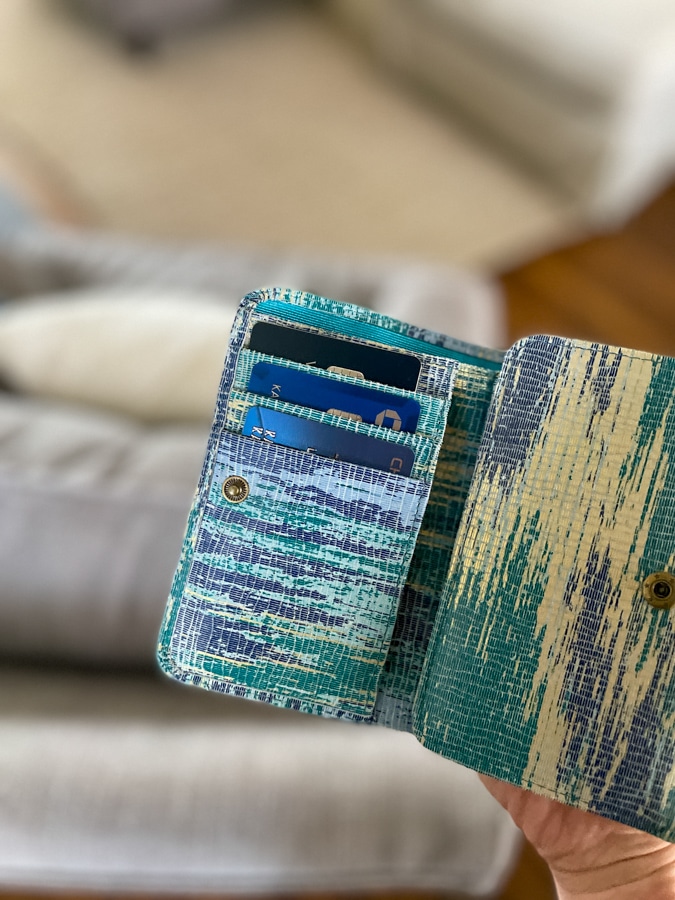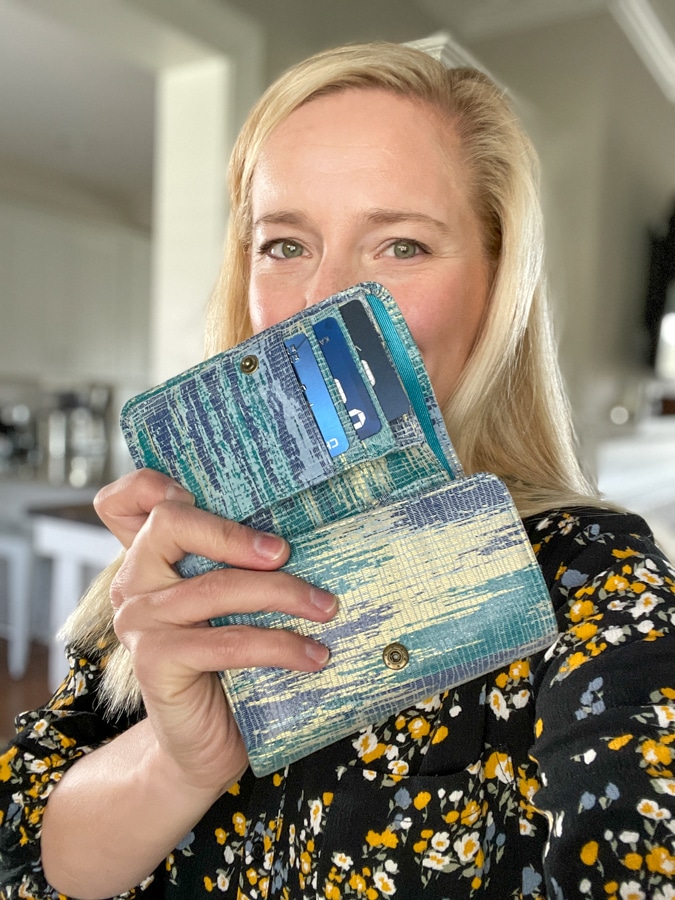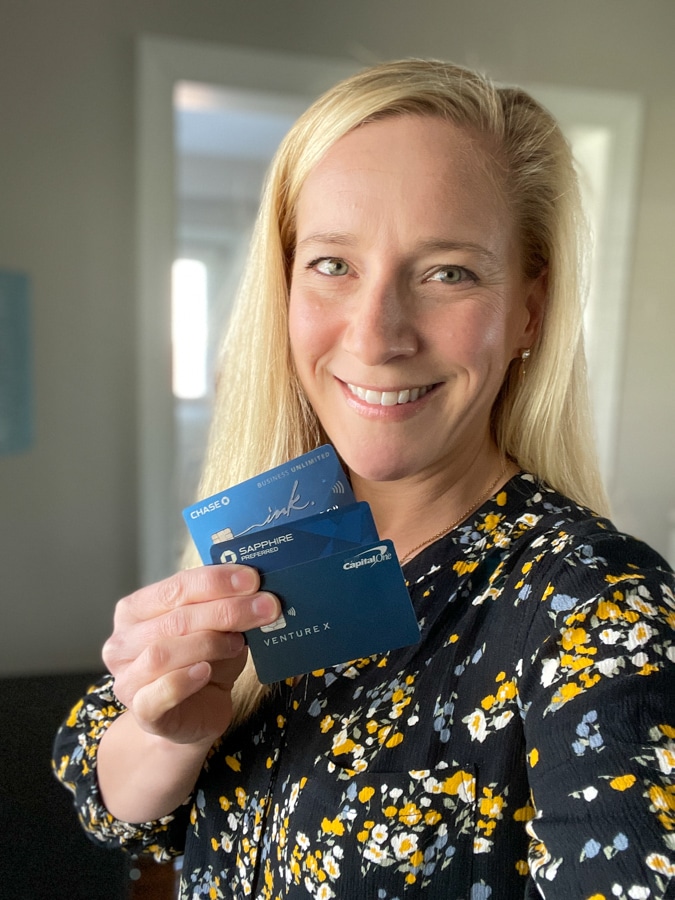If you’ve ever wondered how to travel using credit card points, here is a very basic 101 tutorial on how to get started! Note I have partnered with CardRatings for my coverage of credit card products. Kath Eats and CardRatings may receive a commission from card issuers. Opinions, reviews, analyses & recommendations are mine alone, and have not been reviewed, endorsed or approved by any of these entities. When you’re finished with this post, be sure to check out the next one: Our Credit Card Strategy.
How To Travel Using Credit Card Points
An Intro To Travel Rewards
For years and years I used the same Wells Fargo basic credit card that got me 1% cash back on all purchases.
I was proud of the simplicity in my wallet and ignored all marketing related to credit cards. I paid off my balance in full each month, and was happy when I got $250 cash back to my checking account a few times a year.
Fast forward to the last few years when I started listening to financial podcasts that talked about travel rewards. These people were flying around the world for free using credit card points.
I didn’t understand how, so I ignored it for another year or two, until I finally started paying attention. I realized how much money I’d wasted by not getting into this sooner.
We’ve accumulated more than $10k worth of free travel in one year
Since we started using credit card points, Thomas and I have accumulated more than a million points! That’s $10k+ worth of free flights and hotels.
Our trip to Miami was basically free (other than food), and my stay with Mazen at The Quirk Hotel was, too. We also took a great family trip to the Homestead. While we don’t have plans to uproot the fam and become nomads or travel globally in the near future, I am so, so happy to have learned that we can use points for most of our shorter trips. And do more of them too! I hope to never pay cash for a flight again.
Learning about credit card points is like learning a new language
It takes time to figure out what cards to get, the dos and don’ts of the game, and how credit card points can save you lots and lots of money.
I am still very much a beginner at this, which is great if you are too because I will speak beginner to you!! Here’s the 101 of getting started learning to travel using credit card points.
Note that to get into travel rewards, it’s very important that you are not carrying a balance month to month or spending more than you otherwise would. Responsible credit card use and solid financial habits are musts.
1% Cash Back Is Not Good
The first thing I had to learn was that credit cards come with different benefits. I literally had no idea that some cards got you perks like trip interruption insurance (never pay for that out of pocket!), Peloton credits (a benefit last year), grocery credits, hotel credits, and 5x to 10x points on certain spending.
With my old card I was getting 1% on every purchase. So for every $25k I spent, I got $250.
Cash back seems great, but you get a lot more bang for your buck if you use a card that gives you more than $1 per point. For example, the Chase Sapphire Preferred® Card gets you 3x points on all dining out and the Chase Freedom Flex® gets you 5x points on a bunch of rotating spending categories.
I was leaving a lot of opportunity cost on the table!
Pile On The Value
I used to pay for all travel out of pocket. If I wanted to fly somewhere, I’d spend $300 on a flight in post-tax dollars.
When you book flights with points, you’re buying the same $300 flight without using post-tax dollars. While this tax loophole might change in the future, it makes sense to pay for travel with points accrued because those dollars are more valuable than cash. It’s kind of like paying for healthcare with your HSA.
On top of that, the Chase premium cards get you $1.25 points per dollar, so there’s an extra layer of value in those dollars.
Get The Most Points In Sign Up Bonuses
As I’m sure you’ve seen in commercials or on flights, credit cards offer great sign-up bonuses to entice people to get cards. The best way to accumulate points is to get a new card and spend the dollar amount to get the bonus, usually between 60,000 up to 150,000 points when you spend a certain amount within the first months of opening the card.
When I first learned about travel rewards, I did not like the idea of signing up for so many cards. It went against the minimalism and simplicity I valued. However, I’ve learned that if I go slowly and use a card tracker it’s not so bad. I’m learning which cards to use when to really maximize points.
A Must-Have App To Keep Your Cards Organized
A good spreadsheet is all you need, but I also really love the Travel Freely Card Tracker. It’s free to use, and you can put in which cards you have and it will keep track of your application date, annual fees, and when it’s time for a new card.
The card genie is also a nice perk to recommend which card to get next. You can also put in personal and business to best stagger those as well.
What about annual fees?
While annual fees are not fun to pay, most of the cards that have them have perks that offset the fee.
The Chase Sapphire Preferred® has a $95 annual fee, but it comes with a $50 hotel credit and plenty of other perks.
The Capital One Venture X card has a $395 annual fee, but you receive a $300 annual credit for bookings through Capital One Travel, so the fee is comparable to the lower cards that don’t get as many points for booking travel.
The rewards gained should usually cancel out the fee above and beyond.
Do points expire?
As far as I know, none of the rewards programs expire. The only way to lose your points is if the bank itself shuts down your account for a negative reason. So start accumulating now even if you don’t have any travel in your future!
Why You Should Get Chase Cards First
The reason that the pros recommend starting with Chase is two fold:
- Chase Points are considered super valuable because Chase has excellent transfer partners, including JetBlue and Hyatt (see below).
- Chase has some of the strictest application rules for a credit card issuer, and you can only apply for 5 cards every 24 months. It’s essentially a way they keep people from applying for 100 cards a year.
So start with Chase cards, and then once you’ve gotten the good ones you can move onto other brands, like American Express, Capital One, and Citi.
Credit cards that earn Chase Points
- Chase Sapphire Preferred®
- Chase Sapphire Reserve®
- Chase Freedom Flex®
- Chase Freedom Unlimited®
- Ink Business Preferred®
- Ink Business Cash®
- Ink Business Unlimited®
Who are Chase travel partners?
Transferable points can get you better deals at each of these airline and hotel loyalty programs:
Airline partners: Air France KLM, British Airways, Iberia, Aer Lingus, JetBlue, Singapore, Southwest, United, Emirates and Virgin Atlantic.
Hotel partners: Hyatt, IHG, and Marriott.

Which card should I start with?
Start With The Chase Sapphire Preferred!
Almost universally across the travel reward space, everyone recommends the Chase Sapphire Preferred® as one of the best travel rewards credit cards to start with. It has great perks, a small annual fee, and you get more points than one point per dollar when booking travel.
This was the first card I started with, and Thomas got it right after I hit the bonus. We both earned the sign-up bonuses, Peloton credits that they had last year ($120 in credits between the two of us), free DoorDash upgrades, and tons of spending points this year. It’s our primary card for dining out because it gets 3x on restaurants.
The card earns 5x points on travel purchased through the Chase portal, 3x points on dining, 2x points on all other travel purchases. New this year is a $50 annual hotel statement credit on hotels booked through the portal.
There are also other benefits such as travel insurance coverage, including car rental insurance. This trip cancellation insurance has been a huge peace of mind for me during the pandemic knowing that if we had to cancel a trip we would get a full refund.
Lastly, as a premium card, all points redeemed from the Chase Sapphire Preferred® get 1.25 points per dollar. So if you have 80,000 points, you can redeem that for $1,000 in travel in the Chase portal. This is why you always want to have one premium card with an annual fee in your wallet.
How To Incorporate Business Cards
If you have a business, and the word business is very loosely defined, you can earn even more points. Thomas and I are both business owners, so we have both gotten two Chase Ink® business cards and tons of points that way. You don’t need to have a storefront or need a EIN to be considered a business. If you drive for Uber or make jewelry, you have a business.
The business cards usually have higher spending requirements to get the sign up bonus, but the bonuses are usually much higher too.
Business cards also don’t count toward your 5/24, so you can open them without taking a spot in the queue.
The bottom line is you can really rack up points if you mix business cards into your strategy.
Check out the Chase Ink® business cards and start with those. The two gray ones are no annual fees with lower spends, and the blue one is the premium with a $15k spend.
Not every business can handle that high of a spend (mine couldn’t), but Thomas’s company had no problem with it since they buy a ton of materials for projects each month.
Which Credit Cards Should I Get Next?
You can see a list of all my favorite cards here!
Chase Freedom Flex®
The Chase Freedom Flex® is a no-annual-fee card that earns those valuable points. While the 20,000 point sign-up bonus doesn’t seem like a large one, this card has some of the best point categories to earn 3-5x points for everyday purchases, like gas. In the offer that we signed up for, we’re getting 5x on groceries all year up to $12k. That means 60,000 points if we max it out.
Capital One Venture or Venture X Rewards Credit Cards
The Capital One Venture Rewards Credit Cards are comparable to the Chase Sapphire® cards but have slightly different perks.
The Capital One Venture Rewards Credit Card is great for those wanting a premium travel card with good perks, and the Capital One Venture X Rewards Credit Card is the “ultra premium” level for those who don’t mind a higher annual fee for even more benefits.
I got the Capital One Venture X – my first non-Chase card – when it had an amazing bonus. This card was described to me as being one of the best travel cards out there.
You also get into all the priority lounges in airports, and receive up to a $120 credit for Global Entry or TSA PreCheck®. It also comes with trip cancellation insurance, perks for rental cars, and 10x points on travel booked in their portal.
The Capital One Purchase Eraser is also key if you love staying at AirBnB since it allows you to use points for any purchase coded as travel after your stay. See below for more details on how to use it.
Southwest Cards
Of the airline credit cards, check out Southwest cards to earn the Southwest Companion Pass. It’s a BOGO pass where every time you buy one flight you get to bring a companion for free – great for bigger families!!
You earn it in a year that you accumulate over 125k Southwest Rapid Reward points and you get it for the entire following year too. If you’re going for it, you must listen to this episode of the ChooseFI podcast to get all the details: Families Fly Free.
Citi Premier
The Citi Premier® has also been raved about recently as a great card when you’re branching out from Chase. This card has a great signup bonus, 3x categories, and flexible points with transfer partners comparable to Chase.
American Express
I have yet to dabble in Amex, but it’s coming up on my list!
The Best Travel Rewards Starting Cards
Note these might change from time of publish! Check each offer before applying. These are affiliate links that will always give you the very best offer available even if it’s not a referral.
- Chase Sapphire Preferred® – Best for dining out and travel. Great travel partners. $95 fee.
- Capital One Venture Rewards – Best if you want a second premier travel and dining card comparable to the Chase Sapphire Preferred®.
- Chase Freedom Flex® – Best for everyday use. Great travel partners. No fee.
- Capital One Venture X Rewards Card – Great travel credit card. Lots of travel perks including the super flexible points eraser. $395 fee.
- Chase Ink® Business Cards – Best for businesses. Great for getting Chase points if you have a biz. No fees on two of the cards.
- Southwest Cards – Best for families flying together to get companion pass.
- Amex – The next big points currency I’m heading for! If you’ve started there in the past, you can keep there before branching out.
See all the current best card offers on one page here!

How To Use Points For Booking Travel
Even once I figured out how to accumulate points and which cards to get first, I still felt a little intimidated about how to get the best deal!!!
Those who are pros at travel rewards know all the ins and outs of transfer to this and do this to get the very best bang for your buck. I finally had to just let go of that and do it the simple way: book with points right in the card portals.
Good: Shop through the portal and use points. This is really easy and simple! Search for hotels and flights and redeem your points right then and there. Should you have to cancel, points go right back into your rewards account.
Better: Transfer points to airlines and hotels (using a Chase premium card) and you’ll usually get a better points per flight/night rate.
An example of this is transferring 25k Chase points to the World of Hyatt program and then booking a Hyatt hotel on the Hyatt site. The one risk is that once you transfer points out, you can’t transfer them back in. So don’t transfer until you’re ready to go!
I was thrilled to find out that there are actually a ton of boutique hotels in the portals. It’s not all chains. We tend to like smaller, independent hotels. And I’ve been pleased with what I’ve been able to find to pay with points.
Get Cash Back Instead
You definitely don’t have to use points for flights and hotels. You can also get cash back! Usually travel will give you the best value, but whatever you need most is what you should get.
If you prefer a cash back strategy, check out Cashfreely. It’s the sister site to Travel Freely but with all cash back offers listed instead.
Venture X Purchase Eraser
The Capital One Venture X has a purchase eraser that lets you book right on a hotel/airline website and then erase the purchase from your statement with points. That’s ultimate flexibility! This means you can think about benefits after you travel!!
Anything coded as travel counts – from AirBnB to Uber rides to the Bald Head Ferry. Anything coded as travel. This is a HUGE perk of the Venture X if you love AirBnB and VRBO! I was even able to erase one night of our Primland stay with points I had gotten so far. Here’s my post on why I love the Purchase Eraser.
Travel Freely
As I mentioned above, Travel Freely is a GENIUS card organizer that helps you keep track of what you’ve applied to and when the sign up bonus is coming up. Plus annual fee reminders, and even card suggestions. I’ve been in touch with the founder, Zac, who is a credit card wiz! Get the Travel Freely app here.
Best Offers
Check out my best offers / favorite cards page here!
Leave a comment: what cards do you have or recommend and how have credit card points worked for you!?
Be sure to check out the next one: Our Credit Card Strategy for Travel Rewards.
Note Kath Eats has partnered with CardRatings for my coverage of credit card products. Kath Eats and CardRatings may receive a commission from card issuers.





Denise says
I just signed up for a Capital One Venture and I’m really excited! I traveled with a friend recently and just being able to access their lounges was worth the fee! I’m also going to be roadtripping across the country later this year, and I love that I’ll be able to erase AirBnB and VRBO purchases! I’m going to use your links to start learning more – thanks so much for this post!
Kath Younger says
Yay!! The Facebook groups I’m in highly recommended it. And it counted Primland as a rental and I got a $200 credit back!
Mel says
Quick question! I don’t understand how using points for flights is like using HSA dollars for healthcare. The HSA money is truly pre-tax dollars added to your account. With credit card points you still have to pay off the balance on your card with post tax dollars. Doesn’t seem like a loophole to me, unless I’m not getting what you mean.
Kath Younger says
The points aren’t taxed though. So if you have $2000 in points you have $2000 of free money. The money you’re actually spending and paying off is separate money. Don’t know if I just made that more confusing. It’s a different currency!
Holly says
This was a super useful post, thanks! I’ve always wanted to get more out of credit card rewards points, but haven’t had a chance to do the research. This helps a lot!
Kath Younger says
So glad it was helpful!
Kate says
Do points work for first class tickets? Are there restrictions on dates?
Kath Younger says
Yes totally! Some people in my groups fly all over the world first class with points. They are wizards about finding deals! I have yet to take a first class flight…
I don’t think there are blackout dates, and I haven’t actually booked a first class ticket yet to know, but I think they probably sell out sooner. I’ve booked a few flights with points and it was just like shopping Google Flights.
Samantha says
So excited to read this! I recently got a new card with the goal of learning the travel rewards “game”.
Faith says
I had to smile because I have the same cards 🙂
On a non-travel note, the American Express Blue Cash Preferred card is THE BEST for groceries. It’s 6% back at grocery stores (and 1-3% back for other categories). Plus good sign up bonuses!
Kath Younger says
Hiii Faith!! I haven’t gotten into Amex yet but that’s definitely phase 2! Thanks for the Blue Cash tip – on it!!
Leah says
I’ve had the Choice Privileges Rewards card for almost 20 years and I LOVE it. It’s for free hotel nights with the budget brands Comfort Inn, Comfort Suites, Quality Inn, etc. I’m single without kids, don’t spend much, and don’t accumulate points quickly, but this one gives me about 7 free nights a year with what I spend, and there’s no annual fee. My free points are my “I feel like escaping out of town and just need somewhere to sleep and shower” no-guilt adventure fund. That said, people with more expensive tastes will not want anything to do with this card. 😉
I also recently got the Chase Sapphire Preferred card when they were running a 100K points deal, and just booked 2 tickets to Seattle and still have 50K points left! However, I’ve done some points/value comparisons and I’m still coming out ahead with the Choice card as far as what a hotel room is worth to me and how much I’m getting for each dollar. Still, I love the Chase card for the flights!
Kath Younger says
That’s great on all those hotel nights!!
Danielle says
Great tips, thanks for breaking this down simply! I just got the Chase Sapphire Reserve and am breaking down all of the rewards available.
Caitie wood says
Do the points expire every year or do they accrue? I have little kids (4,2, 5 months) so won’t be traveling toooo much in the near future but would love to get started on points!
Kath Younger says
The accrue as long as you keep the cards active!
rejekibet says
Great tips, Kath! I love how you broke down the process of maximizing credit card points. It really makes traveling more accessible. Can’t wait to put these strategies into action on my next trip!
Deanna says
This might be a silly question but if you book travel through the Chase Portal, do they include flights from all airlines? Not just the partner airlines listed. I ask because the airport I use most often is a Delta hub. It won’t let me look unless I create a login. I’m thinking about trying the Chase Sapphire Preferred card as my entry into travel rewards.
Kath Younger says
Yes, most flights are in there (like Expedia would offer), but you can only transfer to the partners